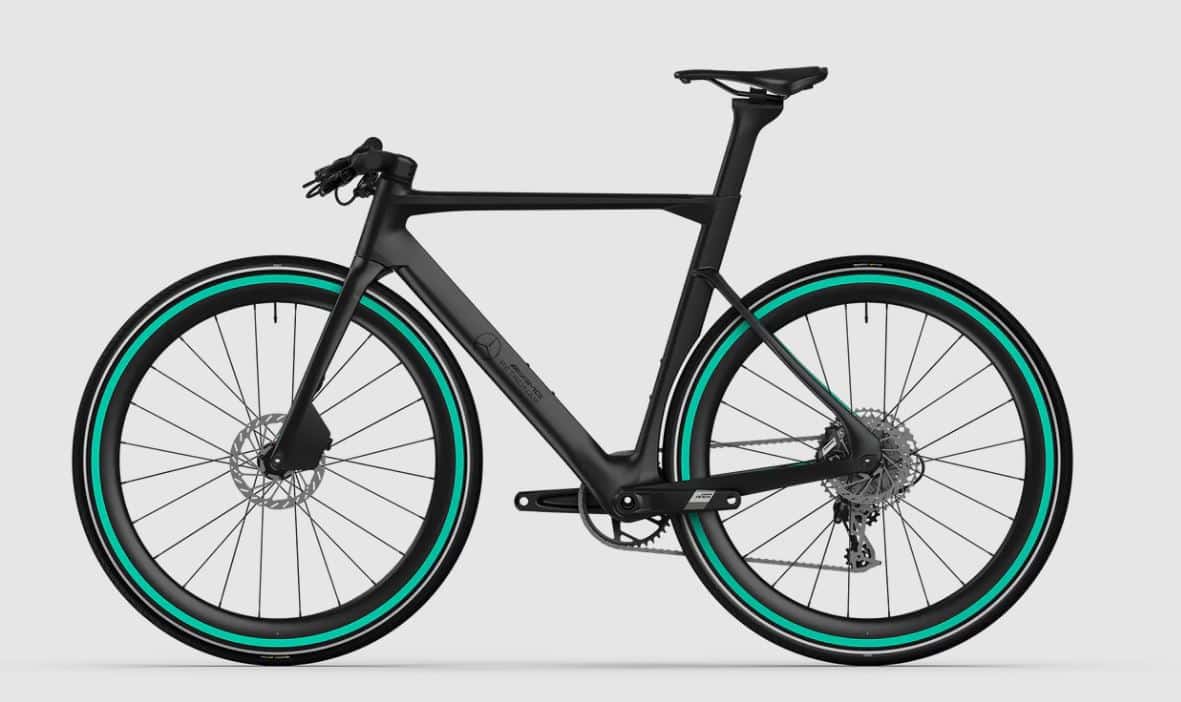The Mercedes-AMG Petronas Formula One Team is taking a bold step into the world of personal transportation with the launch of a premium line of e-bikes and road bikes that fuse decades of motorsport innovation with everyday cycling. Four distinct models have been unveiled, showcasing cutting-edge engineering derived from the high-speed realm of Formula One racing.
The highlight of this launch is undoubtedly the F1 Rallye Edition 750, which is engineered to deliver a thrilling riding experience. This high-performance e-bike features rapid electronic gear shifting capabilities that mirror the precision of Formula One cars, achieving shifts in only 0.2 seconds. Designed for both rugged terrains and intense riding conditions, it promises to tackle steep hills and challenging landscapes efficiently.
In addition to state-of-the-art performance, this model includes a Bluetooth-connected helmet equipped with advanced features such as automatic lighting and integrated crash detection, enhancing rider safety and connectivity. The bike’s robust 720-watt-hour battery allows for 70 miles on a single charge and offers a hot-swappable option, making it an excellent choice for longer excursions.
As urban mobility shifts towards sustainability, these e-bikes, which produce significantly lower emissions than traditional vehicles, represent a significant step forward. The Mercedes-AMG team’s commitment to eco-friendliness is evident in their adoption of renewable energy practices, aiming to inspire a broader shift towards greener modes of transportation. With these innovations, the future of cycling looks not just faster, but also more environmentally responsible.
The launch of the Mercedes-AMG Petronas Formula One Team’s premium line of e-bikes and road bikes marks a significant milestone in the cycling industry, particularly at a time when the market for electric bicycles is witnessing exponential growth. According to industry forecasts, the global e-bike market is expected to reach approximately $38 billion by 2025, growing at a compound annual growth rate (CAGR) of around 7.5%. This growth is driven by increasing urbanization, rising environmental concerns, and a shift towards healthier and more sustainable modes of transport.
The e-bike industry is particularly vibrant as it intersects with various trends in technology and lifestyle. Consumers are increasingly looking for convenient and eco-friendly alternatives to traditional gasoline-powered vehicles. The integration of high-performance technologies into e-bikes, as exemplified by the F1 Rallye Edition 750, is attracting a new demographic of cycling enthusiasts who appreciate advanced engineering and luxury in their personal transport.
Moreover, the shift towards urban mobility solutions has prompted municipalities worldwide to invest in cycling infrastructure, which further fuels market demand. Investment in bike lanes, parking facilities, and rental programs demonstrates a commitment to supporting sustainable transport options. Companies like Mercedes-AMG, with their strong branding and engineering pedigree, are well-positioned to capitalize on this trend.
However, the industry is not without its challenges. Key issues include regulatory hurdles concerning speed, safety standards, and environmental impact assessments. Additionally, as the market becomes saturated with various options—from budget models to luxury e-bikes—companies must differentiate their offerings effectively. The supply chain disruptions experienced during the pandemic have also highlighted vulnerabilities, particularly in sourcing components and materials for e-bikes.
Despite these hurdles, the innovative features of the Mercedes-AMG e-bikes, such as the advanced Bluetooth-connected helmet and the swappable battery technology, could set a new standard in rider safety and convenience, potentially addressing consumer concerns in the market.
As sustainability remains a focal point for many consumers, the Mercedes-AMG team’s emphasis on eco-friendliness through renewable energy practices is likely to resonate well with a growing base of environmentally conscious riders. The initiative could lead to further expansion in the cycling sector, influencing how both manufacturers and consumers engage with personal transportation.
For more information about the cycling industry and trends, you can visit cycling industry news or Bike Europe.
The article has been updated: 2024-11-03 04:40
Here are some suggested related links for your post title “Revolutionizing Urban Mobility: Mercedes-AMG Unveils High-Performance E-Bikes”:
1. Mercedes-AMG – Explore the latest innovations and high-performance vehicles from Mercedes-AMG, the luxury performance division of Mercedes-Benz.
2. Electric Bike – A comprehensive resource for everything related to electric bikes, including news, reviews, and guides on the latest e-bike technologies.
3. Urban Mobility – Dedicated to the latest trends and innovations in urban transportation, including electric vehicles, scooters, and e-bikes.
4. Autoweek – Stay updated with automotive news, including the latest advancements in vehicle technology and performance showcases from various manufacturers.
5. BikeJS – A hub for cycling enthusiasts, featuring articles and discussions on cycling technology, gear, and the growing market for electric bikes.
6. Cycling News – The leading site for cycling news that covers the latest in cycling trends, technology, and events, including high-performance biking options.
7. Road Bike Review – A platform providing reviews and discussions on high-performance road bikes, including electric models, aimed at cycling enthusiasts.
8. Bike.com – An all-encompassing site featuring bike news, reviews, and the latest in biking technology, including e-bikes and innovative designs.
These links can provide valuable context and additional information for readers interested in Mercedes-AMG’s high-performance e-bikes and urban mobility innovations.
The article has been updated: 2024-11-04 20:36
What innovative features do the new high-performance e-bikes from Mercedes-AMG offer to enhance urban mobility?
The new high-performance e-bikes from Mercedes-AMG are designed with cutting-edge technology and features to revolutionize urban mobility. They include a powerful electric drive system that provides impressive acceleration and speed, ensuring quick and efficient travel through city streets. Additionally, the bikes come equipped with advanced connectivity options, allowing riders to integrate navigation and performance metrics via a smart device. The sleek, aerodynamic design not only enhances performance but also provides a stylish look, embodying the luxury and performance ethos of the Mercedes-AMG brand. Furthermore, high-quality materials and engineering ensure durability and comfort, making these e-bikes a practical choice for urban commuters.







